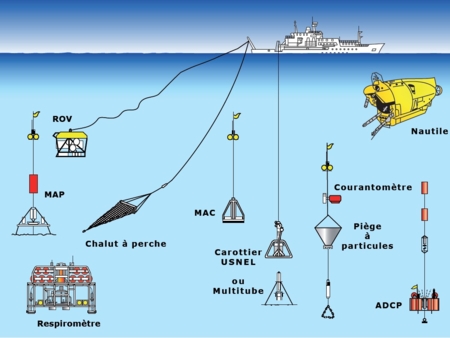Cas Cornet thesis defence from Laboratory of Microbiology of Extreme Environments LMEE
Phylogenetic and functional diversity of uncultivated microbial communities involved in the methane cycle
Come along to Cas Cornet's thesis defence, scheduled for Wednesday 18 December 15:00 PM in IUEM Amphi A
Recent advances in the study of methane-cycling microbial communities have significantly expanded our understanding of their functional and phylogenetic diversity in the environment, including the discovery of novel metabolic pathways and newly identified methanogenic and methanotrophic clades. However, their role and functioning in the environment largely remain unconfirmed, in part because many are still to be cultivated. This thesis presents findings on methanerelated microbial communities in the marine subsurface, through the study of two distinct methanerich sedimentary ecosystems: the Danube Canyon in the Black Sea and the Guaymas Basin in the Gulf of California. The Black Sea underwent a recent geological shift from a lacustrine to a marine environment resulting in a large euxinic basin, whereas the Guaymas basin is characterised by a range of high temperature gradients as a result of hydrothermal activity. The microbial communities in the Danube Canyon, analysed through amplicon sequencing, are compared with geochemical profiles to emphasize settings to explain distribution of lineages potentially involved in the methane cycle.
Underrepresented methanogenic lineages in the subsurface of both the Guaymas Basin and Black Sea were investigated through enrichment cultures utilizing a variety of substrates presumed to stimulate methanogenesis. Our findings concur the unique nature of the Black Sea by highlighting intriguing dynamics in the distribution of bacterial methanotrophs (Methylomonadaceae and Methyloligellaceae), archaeal methanotrophs (ANME-1 and ANME-2 lineages) and methanogens (Methanomassiliicoccales and Methanofastidiosales) in relation to oxygen boundaries, gas hydrate presence and sulphate diffusion. These groups cooccur with a wide diversity of uncultivated microbial populations, including lineages recognized for employing syntrophic strategies. The culturing approach allowed genomic analysis and resulted in the identification of dominant populations of viable opportunistic methanogens from both environments, including several newly discovered lineages affiliated with Methanococcoides, Methanomassiliicoccales and ANME-3.







